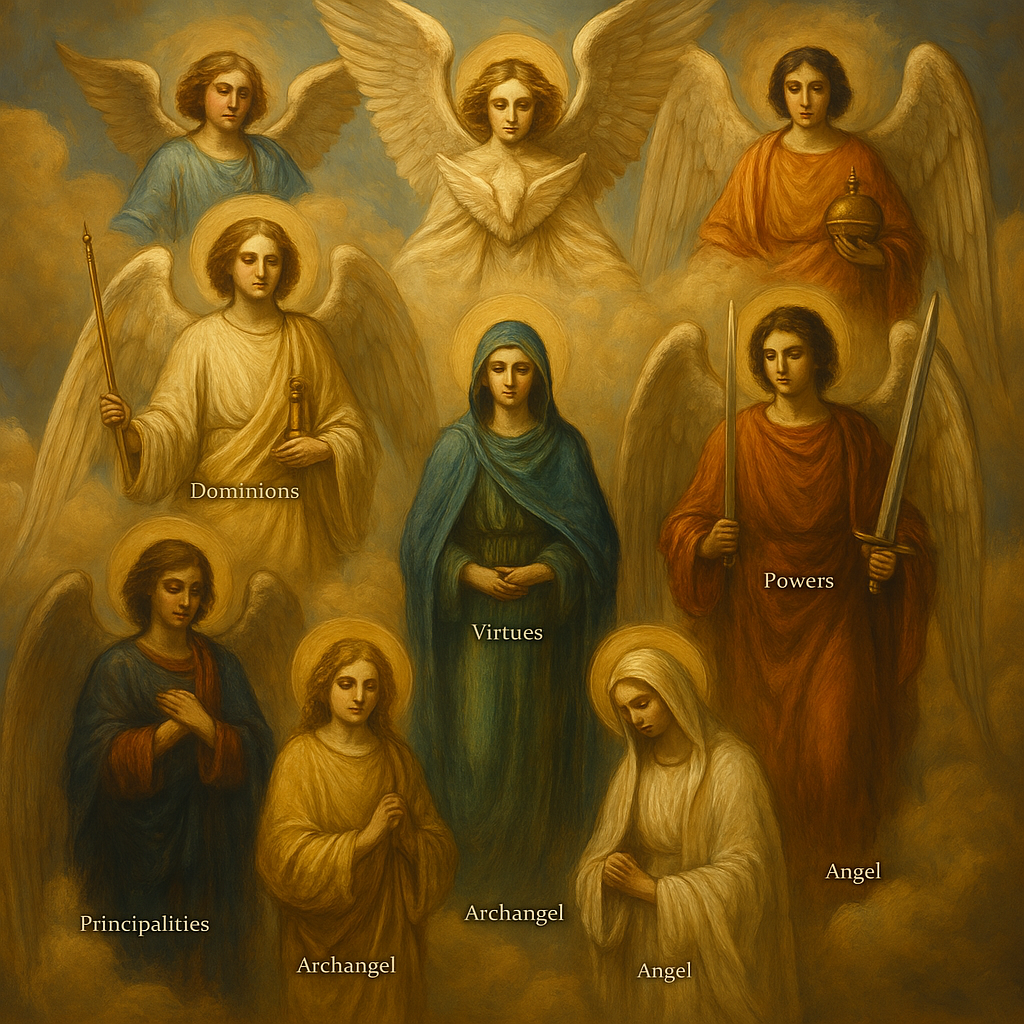Overview
Angelic Choirs refer to the classification of angels into specific groups or hierarchies, each with distinct roles and responsibilities within the celestial hierarchy. This concept is rooted primarily in Judeo-Christian theology but has also been adapted and expanded in various esoteric and New Age traditions. The organization of angelic choirs helps elucidate the structured nature of the divine order, defining the roles and duties of angels in maintaining the cosmos and assisting humanity.
Theological and Spiritual Frameworks
Christian Angelology
- The most influential systematization of angelic choirs comes from Pseudo-Dionysius the Areopagite in his work Celestial Hierarchy, where he categorizes angels into three hierarchies, each containing three choirs.
Judaism
- In Kabbalistic traditions, angels are also organized into ranks and are associated with the ten sefirot or emanations of God on the Tree of Life, each representing different aspects of divine intervention in the world.
Islamic Tradition
- Although less formally structured, Islamic angelology includes various types of angels with specific roles, such as recording deeds, delivering messages from God, or overseeing natural phenomena.
Hierarchy of Angelic Choirs
First Hierarchy
- Seraphim: Often considered the highest order, seraphim are closest to God, continuously singing His praises and emanating divine light.
- Cherubim: Guardians of divine glory and wisdom, cherubim are typically depicted surrounding God’s throne, embodying divine knowledge and enlightenment.
- Thrones: Serve as God’s chariot and are involved in the administration of divine justice, helping to maintain cosmic order.
Second Hierarchy
- Dominions: Regulate the duties of lower angels, ensuring that the cosmos operates according to divine order.
- Virtues: Bestow grace and valor, helping to perform miracles on Earth.
- Powers: Warriors against evil, defending the cosmos and humanity from demonic spirits and influences.
Third Hierarchy
- Principalities: Oversee nations and leaders, guiding them to enact divine will.
- Archangels: Well-known as God’s messengers, archangels communicate God’s will to humans and oversee guardian angels.
- Angels: The most familiar choir, guardian angels are assigned to every human being, guiding and protecting them throughout life.
Roles and Functions
Cosmic Order
- Angelic choirs help maintain the balance and order of the universe, each group fulfilling specific cosmic functions.
Divine Messengers
- Certain choirs, particularly archangels, serve as messengers, delivering divine revelations to humanity.
Guardianship
- Individual angels and certain choirs protect and guide humans, influencing spiritual growth and physical well-being.
Worship and Adoration
- The primary function of the highest choirs, like the seraphim, is to worship God, reflecting His glory back to Him and perpetuating the flow of divine love and light.
Access and Communication
Prayer and Invocation
- Humans can invoke specific choirs for assistance based on their functions, such as calling upon virtues for courage or powers for protection against negative forces.
Spiritual Practices
- Various spiritual practices and rituals may involve aligning with or calling upon specific choirs to aid in spiritual ascension or to accomplish divine tasks on Earth.
Conclusion
Angelic Choirs and Their Functions provide a framework for understanding the complex and ordered interactions between the divine and the earthly realms. By categorizing angels into specific choirs, these traditions offer insights into the multifaceted roles angels play in the cosmos and in human lives, highlighting their importance in both maintaining cosmic order and assisting in personal spiritual journeys.

